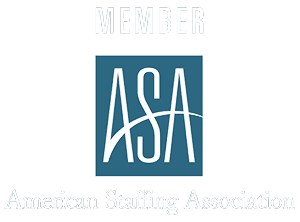If you’re in IT staffing, you’ve likely noticed the demand for tech talent is only growing. But just how fast? Jobs in computer and IT are expected to grow way faster than most other fields between 2023 and 2033, with about 356,700 from new positions and others from people leaving the industry.¹ This presents a huge opportunity, but also major challenges, especially when expanding into multiple states.
Scaling successfully across multiple states means navigating different labor laws, tax regulations, and worker classification rules in each jurisdiction. To expand without getting caught in compliance headaches, staffing agencies need the right strategies in place.
From working with an Employer of Record (EOR) to managing state-specific regulations, here’s how to streamline operations and reduce risk while growing your business.
The Biggest Compliance Challenges in Nationwide IT Staffing
Effective IT staffing nationwide comes with its hurdles. Staffing agencies who anticipate these compliance challenges can help their clients navigate them more easily.
Navigating Tax Laws
Every state has its own tax rules, and for staffing agencies expanding nationwide, that means navigating a maze of income taxes, unemployment insurance, and payroll taxes. Some states like Florida and Nevada have no income tax, while others have complex withholding requirements. Keeping up with these differences is challenging, especially when placing remote workers across multiple locations.
Multi-state taxation adds another layer of complexity. If an employee works in one state but lives in another, or if they frequently travel for work, determining the correct tax withholdings can get tricky. Without a solid system in place, staffing companies risk miscalculations, penalties, and compliance headaches.
Worker Classification Risks
Classifying workers correctly is one of the biggest compliance challenges in multi-state IT staffing. Some states follow federal guidelines, while others have stricter classification rules, making it difficult to apply a one-size-fits-all approach across your operations.
The difference between an employee and an independent contractor isn’t always clear-cut. Some states use the ABC test, which makes it harder to classify workers as contractors, while others rely on broader guidelines. Misclassifying a worker—whether intentional or not—can result in back taxes, fines, and potential legal challenges that divert resources from your core business operations.
State-Specific Employment Regulations
Keeping up with state employment laws isn’t easy, especially when rules around paid leave, minimum wage, and overtime vary so much. Some states require paid sick leave, while others don’t. Minimum wage rates differ widely, and overtime laws can be stricter than federal standards. Staffing companies need to stay on top of these regulations to avoid costly mistakes.
In some states, non-compete agreements are enforceable with restrictions. In others, like California, they’re almost entirely banned. If your staffing firm relies on non-competes to protect client relationships, it’s important to understand where they apply—and where they don’t.
IT staffing comes with its unique compliance challenges. Data protection laws like the California Consumer Privacy Act (CCPA) create strict requirements for handling candidate information—a core function for staffing firms. Meanwhile, emerging AI regulations in states like California and New York City impose different standards for automated hiring tools.²
Remote work arrangements—common in IT—further complicate matters, as states have varying rules governing remote workers’ rights and reimbursement policies. Without expertise in these tech-specific regulations, IT staffing firms face significant risks when expanding across state lines.
How to Expand Successfully
Expanding your staffing efforts across multiple states starts with managing complex legal and compliance challenges. Here’s how you can expand without legal pitfalls:
Use Employer of Record (EOR) Services
Expanding your business into new markets or hiring across different states comes with legal and administrative challenges. But managing these complexities in-house can be overwhelming. To make expansion easier, partner with an Employer of Record (EOR). Instead of managing compliance and administrative tasks yourself, let an EOR handle them while you focus on growth.
Leverage Compliance Technology and Payroll Solutions
Managing payroll, tax filings, and employee records across multiple states creates overwhelming complexity for IT staffing firms. Rather than building these capabilities in-house, partnering with an EOR provider gives you immediate access to sophisticated compliance and payroll technologies without the implementation headaches or ongoing maintenance costs.
EOR specialists invest in advanced systems that continuously monitor regulatory changes across all 50 states, while their integrated payroll platforms handle the complexities of multi-state taxation. These enterprise-level compliance capabilities would be prohibitively expensive to develop independently but become instantly accessible through the right partnership.
Create a Scalable Compliance Strategy
Managing compliance effectively becomes more complex as your business grows. Instead of reacting to legal challenges as they arise, build a scalable compliance strategy that evolves with your expansion plans.
With the right expertise in place, you can stay ahead of regulatory changes and minimize risks. Whether through in-house counsel or third-party advisors, having access to legal professionals ensures compliance across all jurisdictions. Regular audits also help identify risks early and keep policies up to date.
For example, conducting routine payroll reviews can catch errors before they lead to penalties. Staying informed about new labor laws and industry regulations allows you to adjust policies proactively, rather than scrambling to adapt after the fact.
Why IT Staffing Firms Should Partner with EOR Specialists
If you’re still on the fence about whether or not you need EOR Specialists, read on to discover why you should partner with one.
Addressing Tech Industry’s Unique Talent Mobility
One of the biggest challenges IT staffing agencies face is managing talent mobility across multiple states. With an EOR, you can seamlessly manage remote tech professionals across state lines while ensuring proper worker classification, payroll processing, and benefits administration. This is especially important for “follow-the-sun” development teams operating across different time zones and jurisdictions in the United States.
Additionally, the IT staffing industry often places professionals in project-based roles that cross state boundaries. An EOR helps you stay compliant with varying employment laws while providing a seamless experience for both clients and contractors.
Handling IT-Specific Compensation Complexities
Compensation in the tech industry is anything but simple. If you’ve ever handled compensation for IT roles, you know how complex things can get right from the start. Instead of dealing with the complexities of multi-state payroll, equity compensation, and compliance on your own, partnering with an Employer of Record (EOR) ensures accuracy and consistency across states.
With an EOR, you can properly manage stock options and equity compensation for tech talent while staying compliant with different tax regulations. This is especially critical for startups and growing firms that offer equity as part of their compensation packages.
Beyond equity, IT roles often require highly competitive benefits tailored to specialized skill sets. An EOR helps standardize benefits while ensuring compliance with state-specific requirements, so your staffing firm can attract top talent without administrative headaches.
Mitigating Security and Compliance Risks in Tech Staffing
Managing security and compliance in tech staffing requires a proactive approach. Without a clear strategy in place, your firm could face regulatory fines, data breaches, or employment law violations, especially when operating across multiple states.
While some organizations may have dedicated compliance teams, those without one will let these responsibilities fall on the internal HR and legal teams. That means staying on top of complex regulations like HIPAA and CCPA, ensuring that tech employees handling sensitive data remain compliant.
Fortunately, you don’t have to tackle these challenges alone. Partnering with an Employer of Record (EOR) provides expert support in navigating compliance risks, maintaining proper credentialing, and ensuring workforce policies meet both security and labor regulations.
Accelerating Time-to-Market in High-Demand Regions
Expanding into top tech markets means moving fast and staying flexible. But without the right support, admin delays and compliance issues can slow you down when you need to get skilled teams in place quickly.
With an Employer of Record (EOR), you can accelerate expansion by ensuring compliance while moving quickly. An EOR handles critical tasks like tax regulations, work authorization, and benefits administration, so you can focus on delivering top tech talent without unnecessary roadblocks.
If your firm is scaling operations in an emerging tech hub, an EOR can help you onboard temporary workers quickly while ensuring compliance with state-specific labor laws. If you need to adapt to sudden project demands in new states, an EOR removes administrative bottlenecks, allowing you to deploy temporary workers seamlessly.
Futureproofing Against Evolving Tech Employment Regulations
Tech employment regulations are constantly evolving, and staying compliant requires more than just occasional updates. Without a proactive strategy, a staffing agency risks falling behind as new laws reshape the landscape for gig workers, AI specialists, and IT professionals.
An Employer of Record (EOR) helps staffing companies stay ahead of these changes by continuously monitoring new legislation, such as laws targeting gig economy workers or restrictions on AI-driven hiring processes. This ensures that your placements remain compliant without added administrative burden.
For example, as data privacy laws like GDPR and CCPA expand, IT professionals handling sensitive information must meet stricter compliance standards. An EOR simplifies this process by ensuring your workforce adheres to evolving regulations while allowing you to focus on placing top talent.
Scale better with Signature Back Office
No matter what state or region you expand into; your business will benefit from using an EOR provider. By outsourcing your payroll, benefits, and compliance you will streamline operations, reduce risk, and position your firm for sustainable growth.
When you partner with Signature Back Office for nationwide IT staffing, you’ll find it easier to navigate complex regulations with confidence. Contact us today!
References
- “Computer and Information Technology Occupations.” Bureau of Labor Statistics, 29 Aug. 2024, www.bls.gov/ooh/computer-and-information-technology.
- Ebbink, Benjamin M. “Predictions for California Workplace Law Developments in 2025.” SHRM, Fisher Phillips, 21 Jan. 2025, https://www.shrm.org/topics-tools/employment-law-compliance/predictions-california-workplace-law-developments-2025.





